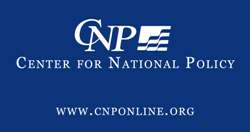Top Qs
Timeline
Chat
Perspective
Center for National Policy
American public policy think tank From Wikipedia, the free encyclopedia
Remove ads
The Center for National Policy (CNP) is an American non-profit public policy think tank headquartered in Washington, D.C.[1]
This article has multiple issues. Please help improve it or discuss these issues on the talk page. (Learn how and when to remove these messages)
|

Remove ads
History
The Center for National Policy was founded in 1981. Peter Kovler, director of the Marjorie Kovler Fund, serves as chairman of the center, succeeding Leon Panetta, CNP's national advisory board chair and former White House Chief of Staff.
Previous presidents and chairmen of CNP include the U.S. ambassador to India and former six-term member of Congress, Tim Roemer, and three former U.S. Secretaries of State: Madeleine Albright, Edmund Muskie, and Cyrus Vance. Other CNP Board members have included former U.S. Treasury Secretary Robert Rubin, former Speaker of the U.S. House of Representatives Thomas Foley, former Republican members of Congress Jack Buechner and Rod Chandler, and former Democratic members of Congress John Brademas and Michael Barnes.
Remove ads
Edmund S. Muskie Distinguished Public Service Award
Summarize
Perspective
The Edmund S. Muskie Distinguished Public Service Award honors the late Edmund Muskie (1914–1996), who served the U.S. in the Navy, as governor of Maine, as U.S. senator and as U.S. Secretary of State. Following his retirement from government service, Ed Muskie chaired the CNP board. Since 1996, the Muskie Award has been presented at an annual event honoring the recipients’ contributions to the country. Recipients included:[undue weight? – discuss]
1996: Secretary Madeleine Albright, U.S. State Department
1997: Lee Hamilton, U.S. House of Representatives
1998: Hillary Clinton, U.S. Senate
1999: Christopher Dodd, U.S. Senate; John Warner, U.S. Senate
2000: William Cohen, Secretary of Defense
2002: Charles Rangel, U.S. House of Representatives; Amory Houghton, Jr., U.S. House of Representatives
2003: Robert Byrd, U.S. Senate; Richard Lugar, U.S. Senate
2004: Charles Hagel, U.S. Senate; Edward Kennedy, U.S. Senate
2005: John McCain, U.S. Senate; Mark Warner, Governor of Virginia
2006: John Murtha, U.S. House of Representatives
2007: Nancy Pelosi, U.S. House of Representatives; Susan Collins, U.S. Senate
2008: Joe Biden, U.S. Senate; General Brent Scowcroft, former National Security Advisor
2009: Dianne Feinstein, U.S. Senate; General James Mattis, commander, U.S. Joint Forces Command
2010: Governor Edward G. Rendell, Commonwealth of Pennsylvania; Police Commissioner Raymond W. Kelly, City of New York
2012: Secretary Leon Panetta, U.S. Department of Defense
2014: Dick Durbin, U.S. Senate
Remove ads
President
In January 2012, Scott Bates became the seventh president of the Center for National Policy. Bates has served as chief of staff for Congressman Nick Lampson, counsel to Congressman Jim Turner, and senior advisor to Congressman Maurice Hinchey. After the September 11, 2001, attacks, he became the first senior policy advisor to the U.S. House of Representatives Homeland Security Committee and was the principal author of Winning the War on Terror, which helped inform the 9/11 commission in its deliberations and the development of its report.[independent source needed]
Directors
- Peter B. Kovler, chairman (CNP), The Marjorie Kovler Fund, Washington, D.C.
- Michael Evans, Counsel, K&L Gates, Washington, D.C.
- Michael Barnes, director, Covington & Burling, Washington, D.C.
- John Brademas, director, New York University, New York, New York
- John Bridgeland, director, Civic Enterprises, Washington, D.C.
- Rev. Cn. Robert J. Brooks, director, Episcopal Diocese of Connecticut, Storrs, Connecticut
- Jack Buechner, director, Anderson Kill & Olick, Washington, D.C.
- Robert Cavnar, director, Milagro Exploration, Houston, Texas
- Elizabeth Folsom, director, Academy for Educational Development, Washington, D.C.
- John Freidenrich, director, Regis Management Company, Palo Alto, California
- David Geanacopoulos, director, Volkswagen of America, Washington, D.C.
- Daniel Glickman, director, Motion Picture Association of America, Washington, D.C.
- Lester Hyman, director, Swidler & Berlin, Washington, D.C.
- Markos Kounalakis, director, The Washington Monthly, Washington, D.C.
- Ira Lechner, director, Katz & Ranzman
- Paul McHale, director, McKenna Long & Aldridge
- Maurice Tempelsman, director, Lazare Kaplan International, New York, New York
- Samuel Tenenbaum, director, Lexington, South Carolina
- Peter Thoren, director, Access Industries, New York, New York
Remove ads
References
External links
Wikiwand - on
Seamless Wikipedia browsing. On steroids.
Remove ads
